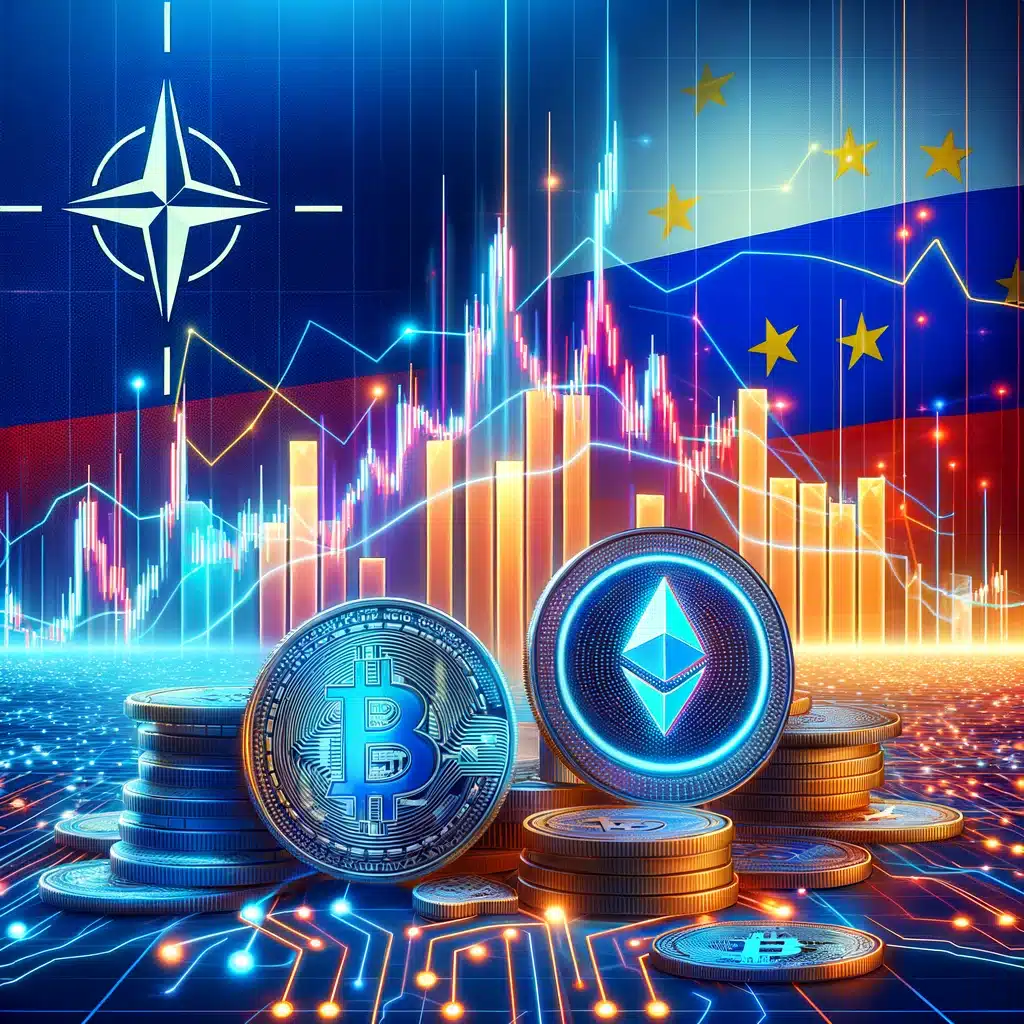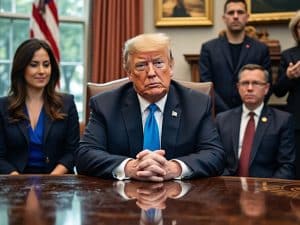What Is The Impact Of A NATO-Russia War On The Cryptocurrency Market Dynamics?

What Is The Impact Of A NATO-Russia War On The Cryptocurrency Market Dynamics?
The current war hunger of Russia has led various secret services and defense specialists to launch warnings that Russia will go for war with NATO sooner or later. And seeing how Putin and co think out loud that is not exactly a surprise.
A conflict between NATO and Russia would have profound implications on global markets, including the crypto market.
In such an event, the immediate reaction might be an increase in volatility across all asset classes, as investors seek safe havens or liquidate positions to cover losses elsewhere. Let’s dive into this theoretical ‘what if’ scenario (but let’s hope we never get into this scenario).
Potential impacts of a war between NATO and Russia on the crypto market
Let’s say that Russia attacks one or more NATO countries leading to a full scale war between Russia and NATO. Here’s a detailed analysis of the potential impacts:
1. Increased Volatility and Safe-Haven Assets
- Short-term Impact: The initial reaction to a conflict would likely see a spike in volatility in the cryptocurrency market. Historically, geopolitical tensions have led investors to flock to traditional safe-haven assets like gold. Cryptocurrencies, particularly Bitcoin, are viewed by some as digital gold, attracting a surge in demand as a hedge against uncertainty.
- Long-term Considerations: The perception of cryptocurrencies as a safe haven is still a topic of debate as we all know. Their performance during times of crisis could solidify or challenge this view, impacting long-term value.
2. Flight to Liquidity
- Immediate Reaction: In the face of uncertainty, there might be a flight to liquidity, with investors preferring to hold cash or cash equivalents. This could initially pressure crypto values downward, as seen in March 2020 during the onset of the COVID-19 pandemic.
- Market Resilience: Cryptocurrency markets could recover quickly, as they have shown resilience in past crises, benefiting from decentralized, 24/7 global trading.
3. Regulatory and Sanction Impacts
- Increased Scrutiny: A NATO-Russia conflict could lead to heightened regulatory scrutiny of cryptocurrencies, as nations seek to prevent evasion of sanctions. This could introduce both challenges and opportunities, as compliance might increase institutional trust but also impose operational burdens.
- Use in Evading Sanctions: Cryptocurrencies might be used by individuals and (state) entities to circumvent sanctions, potentially increasing demand but also risking further regulatory crackdowns.
4. Global Economic Impact
- Economic Uncertainty: A prolonged conflict could lead to economic instability, impacting traditional and digital asset markets. Cryptocurrencies might benefit from a loss of confidence in fiat currencies and financial institutions, especially in affected regions.
- Inflation Concerns: Increased military spending and economic sanctions could fuel inflation, leading investors to seek assets perceived as resistant to inflationary pressures, including cryptocurrencies.
5. Technological and Infrastructure Considerations
- Cybersecurity Risks: Heightened geopolitical tensions could increase the risk of cyberattacks on critical financial infrastructure, including crypto exchanges and wallets. This could undermine confidence in digital assets if significant breaches occur.
- Internet Control and Restrictions: The conflict might lead to increased internet control and restrictions, impacting access to cryptocurrency exchanges and services, especially in regions directly affected by the conflict.
As you can see, the value of cryptocurrencies in the event of a NATO-Russia conflict is likely to be influenced by a complex interplay of investor sentiment, regulatory responses, and the broader economic impact of the conflict. While there could be short-term volatility and downward pressure on values, certain cryptocurrencies might also see increased demand as alternative stores of value or means of transaction, especially if traditional financial systems are perceived as vulnerable or unstable.
And what about Russia versus the Crypto market?
Russia has a complex and evolving stance towards cryptocurrencies. While there have been discussions and proposed regulations aiming to create a legal framework for digital assets, the country has also shown ‘concerns’ about cryptocurrency’s potential for money laundering, fraud, and evasion of sanctions.
As a result the Russian government has taken steps to both recognize and regulate digital assets. Legislation passed in recent years acknowledges the existence of cryptocurrencies, but there’s a clear directive that they cannot be used as a means of payment, positioning them more as investment vehicles or digital assets. The regulatory environment remains somewhat uncertain, with proposals that could either tighten controls or further integrate digital assets into the Russian financial system, impacting market dynamics significantly.
Despite regulatory ambiguities, there has been significant interest in cryptocurrencies within Russia. The country has a strong community of developers, miners, and traders. Russia ranks high in terms of global cryptocurrency mining, although the exact positioning can fluctuate based on regulatory pressures, global market conditions, and the availability of cheap energy sources, which are crucial for mining operations.
Cryptocurrency trading and investment are popular among the tech-savvy and younger populations, driven by a desire for financial diversification, investment opportunities, and, for some, a means to circumvent international sanctions.
War, but not in cryptoland?
The potential for cryptocurrencies to be used in circumventing sanctions is a concern shared by many governments and regulatory bodies globally, including in the context of Russia. Cryptocurrencies, due to their decentralized nature and the anonymity they can provide, offer a mechanism for individuals and entities to move value across borders without the direct oversight of traditional financial institutions or government regulators.
Ironically this means that the crypto market is able to exist and function without being impacted by sanctions. Which basically is already the case since both Ukranian and Russian platforms also accept crypto payments making it largely the only currency that is active on both sides.
In response to these concerns, many countries, including Russia, are exploring or implementing regulatory frameworks to bring cryptocurrency transactions within the purview of national and international financial oversight. This includes measures like Know Your Customer (KYC) and Anti-Money Laundering (AML) regulations that apply to cryptocurrency exchanges and wallets, aiming to prevent their use in illegal activities, including the evasion of sanctions.





